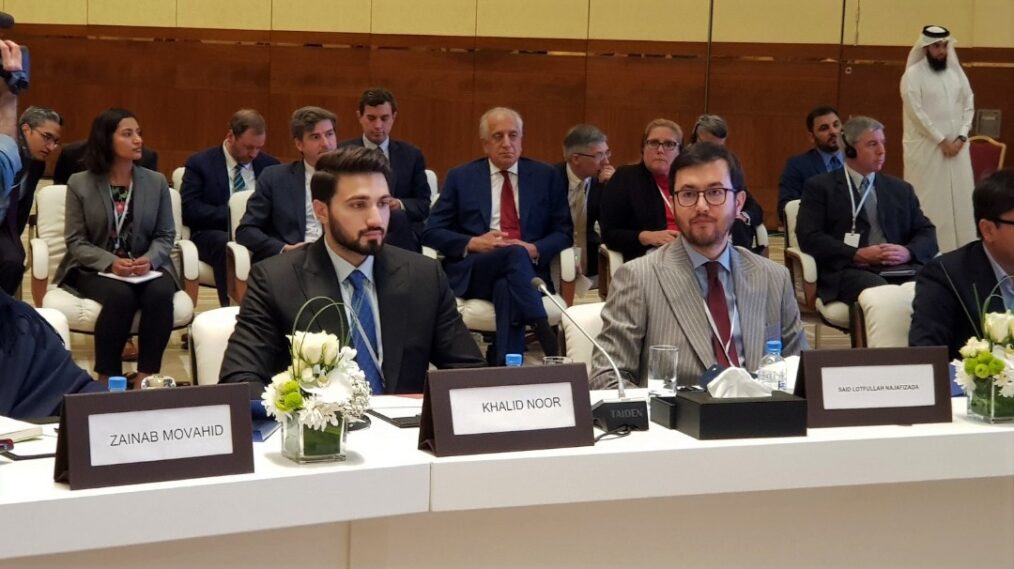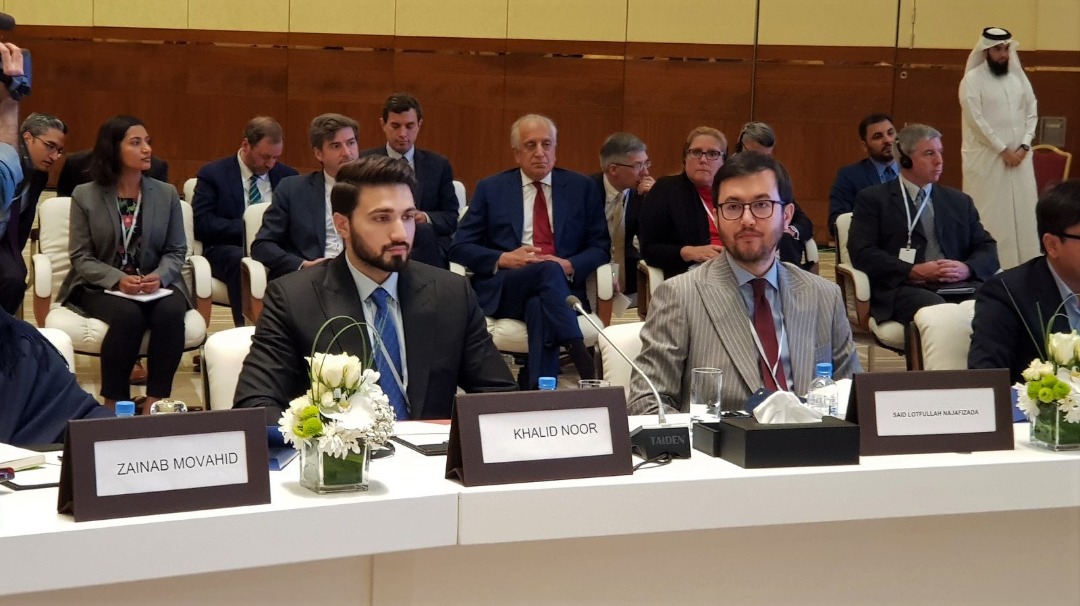
Exclusive interview with Khalid Noor on Doha peace conference
Amid a series of peace talks over the last months, Taliban and Afghan representatives gathered in Doha and agreed on a roadmap to end the 18 years of war. Since last year, the U.S. appointed Zalmay Khalilzad as the lead Special Representative for Afghanistan Reconciliation to broker a negotiated settlement between the Taliban and the Afghan government, in hopes for a long term ceasefire.
In Doha, Qatar, a meeting co-hosted by German and Qatari officials brought together diverse individuals interested in achieving lasting Afghan peace. Sixteen Taliban and sixty Afghan representatives (composed of delegates from political parties, government officials and civil society organizations) engaged in discussions that led to a potentially positive arrangement. Doha conference, instilled newfound hope as the Taliban agreed to reduce its reliance on violent attacks by avoiding various public spaces. Rise to Peace’s Ahmad Mohibi interviews Khalid Noor, one of the participants at Doha conference, to give a closer look at the future of the Afghan peace process.
What is your takeaway from the Doha Peace Conference?
Khalid Noor: I think the Doha meeting was a great opportunity for the two sides [Taliban and the Afghan representatives] to sit down and share their issues, and to explain their concerns with each other. The talks provided the opportunity for both sides to discuss some of the most sensitive and critical topics that were overlooked at previous peace talks. For instance, we talked about regime creation. I personally changed the nature of the meeting from ceremonial to more serious discussions with my thoughts, that we want the regime to be the Islamic Republic of Afghanistan — this is our goal and our red line. The Taliban wants an Islamic Emirate and that’s their red line.
What were some of the questions that were brought forth to the Taliban at the Conference?
Khalid Noor: We would like to know how likely it is that the Taliban is willing to participate and accept our Islamic Republic if we bring substantial changes. My next point was that elections are valuable to us and we are not willing to lose them at any cost. Our fellow citizens are concerned about this, but they want to know: will you [Taliban] participate in an Afghan lead election that is controlled and financed by Afghans after reaching an agreement on a coalition government?
The moderator interrupted me shortly after my first two questions and requested if it’s possible to avoid technical and serious questions in order to not disrupt the meeting. I respectfully accepted but continued with my last question: Is it possible to elaborate and emphasize freedom of speech? For instance, you [Taliban] have said though press releases and other forms of public messaging, that the Taliban would respect freedom of speech. Although, in your other statements the Taliban threatens media over the same matter. It’s imperative for us to understand, ‘what’s happening on your side and what is your vision of certain freedoms in Afghanistan?’
What was one of the main points that both parties were mostly concerned about?
Khalid Noor: After listening to each other’s questions and concerns, the two sides started to raise their issues about violent attacks. For instance, we shared our sorrows and criticized the current Taliban tactic of sending suicide bombers to kill innocent people in congested parts of the cities. It is not Islamic or logical. The Taliban also criticized the Afghan government by saying that the government ‘only talks about the civilian casualties caused by us [Taliban] and not the night operations conducted by the government, that resulted in the martyrdom of our people and civilians. No news agency reports that. So, when you [Afghan government] raise such concerns, it’s also necessary to discuss our casualties as well.’ One of the Taliban members sternly asked, “Do you think our civilian casualties are not human beings?”
Were there any other matters discussed following the Taliban’s concern of mass casualties?
Khalid Noor: The Taliban raised another point about human rights after we repeatedly defended human rights, women’s rights, and freedom of speech. They told us, “since you are speaking about human rights, is human rights only what you hear about on television and what you believe is right, or do you think about what we go through? They [Afghan National Security Forces and Coalition Forces] enter our homes at night, disrespect our women, our children, and mothers. For example, one of our commanders was arrested by the Afghanistan National Intelligence Agency and the National Directorate of Security (NDS).
When he was taken into custody at NDS, the investigators told him “Now call your God to help you.” The Taliban expanded on this example and challenged us on “what part of this misbehavior of our personnel, where torture is following the principles of human rights?” They continued and said, “if you look at the prison systems, they are not fair to us [Taliban]. Aren’t your human rights’ values applicable to this case or it’s only the media that shows our negative actions?” Taliban said “we are not denying our mistakes. We have done mistakes but to be fair, it’s good that both sides accept the mistakes.”
Who were some of the other key representatives at this Conference?
Khalid Noor: The two sides listened carefully to each other’s issues and concerns. Our Muslim scholars, who were part of the Kabul delegates, also condemned Taliban actions and illustrated that our interpretation of Islam is better than the Taliban interpretation. The Muslim scholars added that it’s imperative that we [Afghan and Taliban] scholars sit and discuss these issues and come to a conclusion whose interpretation of Islam is right or wrong.
Would you consider this meeting successful?
Khalid Noor: The main point of this meeting was that an opportunity emerged so that both sides could clearly raise their thoughts patiently. This was unlike many other peace talks. In previous conferences, the intra-Afghan dialogues were smaller, about 5-6 people from the Taliban and Afghan side. Unlike before, this time we were part of a bigger team where we discussed various topics. Most importantly, the Taliban delegates participated in the conversation and answered questions. This was a great achievement.
What can be done to increase the likelihood of success in future peace talks?
Khalid Noor: On day two, we were more open to collaborative discussions compared to the first day where mostly everyone was serious and had this hatred towards each other. Representatives from both sides felt comfortable to share something and they listened to each other. I really think that this was a good meeting as the two sides exchanged ideas. If we had one or two more days, I really believe that our discussion could have been more technical and friendlier. It’s imperative to keep such talks in the future. In addition to actual Afghan-Taliban peace negotiations, we need to have separate dialogues, because negotiations can be tough sometimes and in that circumstance, it’s better to refer the issue to the dialogue team, so they can discuss it without a judgment call or simply answer out of ignorance.
Do you believe that the Taliban will keep their promise in efforts to reduce violence?
Khalid Noor: It’s too early to know if the Taliban will keep their promises or not. But I have to express that the two sides [Taliban and Afghan government] should be involved and support each other. It’s important that both the Afghan National Security Forces and the Taliban fighters implement the promise reached by both sides at the meeting. We are both held accountable. A judgment call can be made if we see a civilian casualty in any of their attacks. We would ask them: You promised us that you would not attack civilians, so what happened that now you attacked schools, hospitals, and targeted civilians? Thus, their promise is a way to keep them responsible for their actions.
This is in case they break the agreement, and they most likely will. But, it’s difficult for us to understand how strongly they are going to keep their promise.
What are some of the drivers for the Taliban to end their fight and join the Afghan government?
Khalid Noor: Some of the main reasons that the Taliban are willing to come to a negotiated settlement and end the war which the Afghan and American governments, along with the international community, believe that no party or side will create peace through war or the use of force. Neither the Taliban can defeat us, nor we can defeat them. In the past 18 years, we have been fighting continuously on the frontlines. Although the Taliban had massive casualties, they are still standing strong against the Afghan government. I do believe that each side has come to the understanding that negotiations are the best option, as war is not the solution to problems.
At the same time, we can tell they [Taliban] are tired of fighting and do not want to continue this war. Their foot soldiers are getting older and the leadership may face trust issues with the current generation of soldiers, as they may not be as loyal. I do not know for sure, but this is my personal understating.
Taliban said, “We also would like to see our children go to school. But because of you [Afghan government], we seek refuge in the mountains, so we cannot send our children to gain proper education and have the basic needs of living.”
What can the Afghan leaders offer to meet those drivers?
Khalid Noor: I strongly believe that the two sides [the Afghan government and the Taliban] should compromise on certain issues and accept each other’s point of view. Without compromise and understanding, there is no other way to solve the problem. The two sides should meet in the future to discuss their concerns. They may need to revise some of their strong policies or views to reach the common goal of a deal to build a regime in Afghanistan.
How does the U.S. contribute as the main broker in intra-Afghan dialogues?
Khalid Noor: The U.S. role in negotiations is critical. Bringing the two sides to a negotiation table is great assistance. Second, if the U.S. direct talks with the Taliban are successful, then this will definitely support the Afghan peace process. Additionally, the U.S. role in pressuring political parties and the Afghan government, so they can come to a united stand in efforts to negotiate with the Taliban, is very critical. I do believe that the U.S. has a key role in encouraging politicians, elites and the opposition to work together on a unified agenda and concept.
Ahmad Mohibi, a writer and activist is the founder of Rise to Peace. Follow him on Twitter at @ahmadsmohibi.


